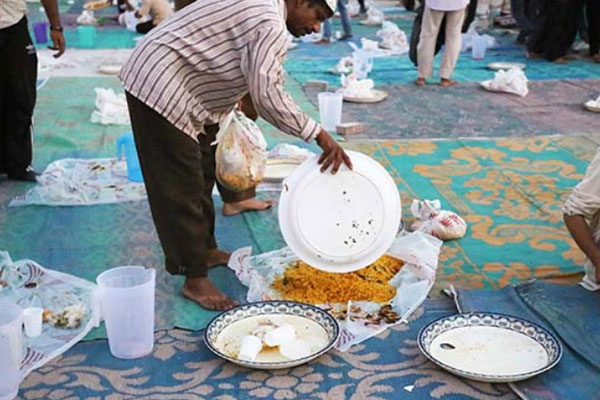
'600 tonnes of food wasted daily in Bahrain'
MANAMA, July 12, 2015
Up to 600 tonnes of food is being thrown away every day during Ramadan in Bahrain, according to an expert.
As much as 30 per cent of the food that people buy ends up in the bin during the holy month, Supreme Council for Environment waste disposal unit head Rehan Ahmed, was quoted as saying by the Gulf Daily News, our sister publication.
Ahmed said it was placing a heavy burden on the country’s sanitation services and also damaging the environment.
“This extra food waste has to be stored in communal bins provided by contractors, handled, loaded and transported by trucks and disposed at the landfill site, where it is compacted and covered with soil,” he said.
“This causes an extra burden on the waste collection contractors, cost to municipalities and takes up more space.”
Ahmed blamed the increase on the fact that Bahrainis who fasted during the day preferred to eat fresh food at various meals during the night, such as iftar and suhour.
“A large quantity of food is wasted, which is often cooked and then not eaten,” he said. “People prefer to have fresh food and items made for suhour, which are not usually consumed at iftar.
“Similarly, food items made at iftar are not eaten at dinner where the menu is different, causing a great wastage of food which ultimately lands in the Askar landfill.”
The discarded food is a combination of fresh produce that expired and cooked food that went uneaten.
Ahmed said that when it wasn’t Ramadan an estimated 400 tonnes of organic food waste was generated on a daily basis.
“During Ramadan this is around 50 per cent more, say 600 tonnes per day,” added Ahmed.
“Normally, it is estimated that around 0.3 kg of food per person per day is wasted, accounting for around 12 per cent of the total food being bought.
“During Ramadan, this increases by 50 per cent to 0.45 kilogrammes per person per day.”
Quoting official data he explained that demand for meat and meat products, vegetables and fruits also increase by around 50 per cent in Ramadan, but said people were often wasting money on things they wouldn’t eat.
“The major problem is huge waste of money in procuring expensive food items which are mainly imported,” he said.
However, consumers are not the only people guilty of stockpiling fresh food only to throw it away.
Ahmed revealed that retailers often ramped up their orders in Ramadan, only for unsold products to be thrown away.
However, he stressed that the large amount of money being wasted was not the only cause for concern – since wasted food in Bahrain produced the equivalent of 2,700 tonnes of greenhouse gases every day.
“It is worth reminding ourselves that for every tonne of food waste we avoid creating, we save four and a half tonnes of carbon dioxide (CO2) equivalent,” he explained.
Scientists say CO2 is a main contributor to climate change, but there is also a religious motivation for people to conserve food – especially during Ramadan.
Religious cleric Abdulla Al Maghabi told the GDN that the Quran specifically urges believers to avoid wasting food.
“According to the Quran, wasting food is a sin like every other sin,” he said. “The Prophet says: ‘Eat, drink and never waste on that.’ “
“We cannot eat beyond a limit, which we know, so why do we store so much when it could benefit others? By not wasting food, we are respecting our resources, which are depleting,” he added.
Meanwhile, Al Watan Society board member Noora Abdulla described food wastage as “criminal”.
“One person in the world dies every three seconds because of hunger,” she said.
“In my view, waste of food is criminal – especially during Ramadan. I believe it would be a great idea if people made it a habit to collect extra food from hotels, restaurants and houses, pack it and deliver to poor families.” – TradeArabia News Service







